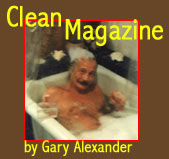Schrader's Nadir
KINGSTON MUSICIAN'S COMEBACK FROM CANCER
by Gary Alexander
Musician
John Schrader of Kingston very clearly remembers a remark a
friend made to him one night in 1987. "One of two things is going to
happen tomorrow," said his friend. "You're either going to be the
happiest person in the world or you're going to grow up, just like
that."
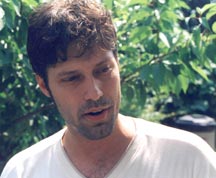
At 21, Schrader knew that growing up was on the agenda but he was
hoping he didn't have to do it all in one instant. He had been troubled
by pain and swelling in his lower abdomen and had been told at the
hospital that it might be an infection. But, when the antibiotics
prescribed for him were ineffective, he had returned for further tests.
A large tumor had been detected and the night of his friend's visit was
the eve of the day he would learn the results of a biopsy. It wasn't
good news.
"After the surgery, they basically gave me five years," Schrader
recalls. "They said my type of cancer frequently returns to the lungs,
brain, stomach within five years. At that point, I had to go for testing
every month. I have no health insurance. My father died of cancer in
1975 and my family's never had a whole lot but we really had to struggle
now. Tests and CAT scans every month. It was really mounting up and it
was horrible. It changed the way the way I thought."
One way he changed, Schrader said, was in the way he saw people.
"They way they are and they way they act. This made me extremely
in tune with everything around me," he reflected. "If you don't think
you're going to be around on this earth for much longer, you might have
a tendency to be more lucid and pay more attention."
Schrader credits his experiences as he recovered with helping to
shape his creative output, particularly the tendency of his lyrics to
angst and ambiguity. He quotes a line from Charles Bukowski's screenplay
for the movie "Barfly" when its chief character, a writer living on the
lower edge of society who is offered a comfortable country retreat in
which to write, responds by saying that no writer worth a damn ever
wrote in peace.
"With lyrics, it's not black and white; it's the shades of
grey," Schrader shrugs. "Maybe 90 percent of my material comes from
angst or pain. I'd like not to believe that statement but it seems more
true than false. Everything that I write is personal. It's happened to
me. I've never been a storyteller like some songwriters. One I really
respect as a lyricist is Tom Waits. He paints pictures with words
beautifully but a lot of times he's telling a story. I can't do that."
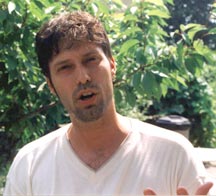
On his first CD, "From Discontent," Schrader performs a
progression of pop rock tunes on which he plays all guitars, piano,
keyboards, drums and bass while singing lead and background vocals as
well as arranging and producing. On one song, "97th Need," a shorthand
musical philosophy spills into the first verse; "Don't want their
money...Don't need their fame/Don't need the power that comes with the
name/Some peace of mind and time...time to find the rhyme."
Schrader recalls trying to play the violin in third grade
because his teacher thought he had long "violin fingers" and assigned
him an instrument he quickly grew to dislike.
"In the third grade, you're too young to respect the beauty of
the instrument and, of course, I wanted to play drums like every other
kid in elementary school," he said. "I hated it. I was so poor at it
that I used to fake it, holding the bow an inch over the strings while
the school orchestra was playing because I really didn't know what I was
doing. I remember the girls in the flute section going ‘Look, he's
faking it!' and I was mortified."
He started studying drums the following year and stuck with
it, receiving private lessons. In high school, without plans or money
for college, he credits a guidance counselor with getting him a music
scholarship for which he hadn't even applied.
"He didn't even tell me that he was going to get it for me.
One day he asked me all these questions and I didn't know why. He died a
month or so after it started and I never got to thank him. That upset me
because I know it was him that got me the scholarship."
After studying music at Ulster Community College for two
years, Schrader was accepted to a School of Music in Albany but felt
"jaded" and stifled after another two years of study and left to follow
an urge to bend the musical rules he was absorbing into forms he
considered more suitable to his tastes. At 20, he began writing and
recording material at a friend's studio in Port Ewen which he'd just as
soon forget today but in the process began to learn "a lot about writing
and guitar playing, how studios work, that kind of thing." It was an
experience which prompted him toward further study.
"I went back to New Paltz and got a degree in video,
audio and television production," Schrader recalls. "I made a lot of
connections, scored independent films; 3 or 4 soundtracks. I've done
commercial projects; assistant director, director of photography for a
couple of commercials that were on CBS, CNBC, that sort of thing."
Applying his studio savvy to the production of his own
CD, Schrader went through a process of purging and catharsis which he
recognized only in retrospect. He was dealing with subject matter so
personal that he felt it worth the risk of the inbreed sound which
results in many self-produced projects that lack a perspective of
distance.
"I did everything, not as a matter of narcissism but
because writing is the most personal thing I could possibly do,"
Schrader said. "I think it would take away from where I was coming from
to have other people involved. Tom Waits said it beautifully when he
said that having someone write a song with him would be like having
someone watch him take a bath."
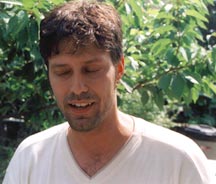
Conversely, Schrader most enjoys playing live with other
musicians. A 7-piece band he has been frequently playing with in recent
months, John Schrader and Damaged Goods, has treated venues in New York
City and up and down the Hudson Valley to blues stylings quite distinct
from the kind of pop form he generally writes into. They'll be playing
the summer concert series at The Strand on August 27th and, by then,
Schrader speculates that they may be including a tune or two from a
second CD he is about to release.
"It's tough to get FOUR guys together who can mesh, let
alone seven, but these guys are tremendous," he said. "When they start
grooving, I get so into it I almost feel like I'm a fan watching from
the audience. I suppose I could go about doing my songs solo but would I
enjoy it? I don't think so because I need other people to feed off. I
feed off the band, the audience."
Frank Casciaro on bass, Guy Gabriel on guitar, Charlie
Staxx on keyboards, Dave DeGraw and Doug Herrmann on saxophones and Greg
Vandine on drums back Schrader's Damaged Goods and a couple even add a
few notes to the new CD, "Blood In the Wood" but, once again, it is
almost all Schrader.
"Stevie Rae Vaughn was the reason I first picked up
guitar," Schrader said. "He's got that thing on him and it's not just a
piece of wood and metal; it's an extension of himself and he's
channeling the music through himself, into his hands, into the guitar
and then out in one cyclical motion. You want to have the guitar as much
a part of you as possible, so, when I'm changing strings and prick my
finger, I'd rub the blood into the neck of the guitar to make it full
circle and put more of myself into the music. So, that's where the title
(Blood In the Wood) came from."
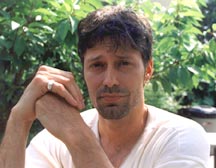
"Each song is an isolated incident from over the past year or
something I've held over from childhood," Schrader says of the new
album. "I didn't think I could top myself emotionally but I think I
reached deeper inside myself for this (CD). My dad died when I was nine
years old and I have a lot of anger because of feeling that he left me,
my brother, our family and we didn't have a whole lot. There's a song
called ‘In Your Name' and I never wrote a song about my father before
this one time. It's not a happy song. It's not ‘Dad, I miss you' and all
that kind of stuff but it's one time I got all of that out; finally,
musically, now.
John Schrader's first album is available from Blue-Byrd's Records
on The Strand in Kingston and through
his website.
Gary Alexander
is an independent journalist and scholar whose focus of
interests range through a variety of disciplines. Under various names,
he has written (and ghost written) upon history and current event;
science and technology, as well as music and the arts in books and for
national periodicals. While particularly attentive to the subtle and
complex impact upon cultural imagination and contemporary structures of
presumption which activity in the above mentioned topics tend to have,
Alexander treats his topics with a slightly more than occasional resort
to humor.
Posted on October 16, 2000
| 